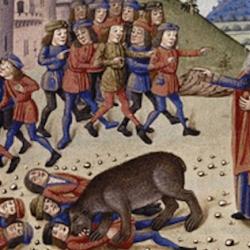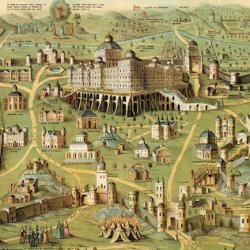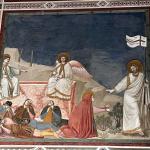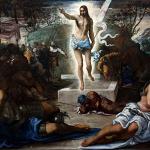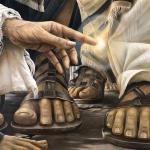Apart from a few suggestive comments in Ephraim Radner’s The End of the Church , I know of no study that examines the Reformers’ use of Israel’s history as a paradigm for understanding the Reformation itself and as a program for that Reformation. (Radner cites an article by Congar that I haven’t been able to get my hands on, and one by von Allmen. Both Congar and von Allmen are reflecting more directly on modern ecclesial divisions rather than specifically on the Reformation.) Here are a few quotations (taken from Radner and Eamon Duffey) that indicate the study is worth doing.
The Reformers believed that the late medieval church had fallen into the kind of idolatry that characterized the Northern kingdom of Israel throughout her history. Calvin dismissed the Catholic claim that they were the church of the church fathers, of Cyprian, Ambrose, Augustine, and Chrysostom: “The difference will appear as great as that which the Prophets describe between the famous Church which flourished under David and Solomon, and that which under Zedekiah and Jehoiakim had lapsed into every kind of superstition, and utterly vitiated the purity of divine worship.”
In the following century, the English Puritan John Owen described the conditions of Roman Catholicism in terms of Israel’s history: “She hath fallen by idolatry and corruption of life; as did the church of the Jews before captivity. She hath fallen by her relinquishment of the written word as the only rule of faith and worship, and by adhering to the uncertain traditions of men; as did the church of the Jews after their return from captivity . . . .She hath fallen by schism in herself – as the Judaical church did when divided into Essenes, Sadduccees, and Pharisees – setting up pope against pope, council against council, continuing in her intestine broils for some ages together.”
They also appealed to the example of the prophets of 1-2 Kings to defend themselves against charges of schism. In a section of his reply to Sadoleto, a Catholic Cardinal, Calvin gives his answer to the charge that the Reformers have abandoned the church, framed as an address to God before His judgment seat. At the center of this defense is an appeal to the example of the prophets: “I had before my eyes the examples of thy prophets, who I saws had a similar contest with the priests and prophets of their day, though these were undoubtedly the rulers of the Church among the Israelitish people. But thy prophets are not regarded as schismatic because, when they wished to revive religion which had fallen into decay, they desisted not, although opposed with the utmost violence. They still remained in the unity of the Church, though they were doomed to perdition by wicked priests, and deemed unworthy of a place among men, not to say saints.”
And they also believed that rulers with Protestant sympathies should imitate the iconoclasm of the great reforming kings of Judah. Archbishop Thomas Cramner exhorted the young Edward VI of England to imitate the great reforming kings of Judah: “Your majesty is God’s vice-regent and Christ’s vicar within your own dominions, and to see, with you predecessor Josiah, God truly worshiped, and idolatry destroyed, the tyranny of the bishops of Rome banished from your subjects, and images removed.”






